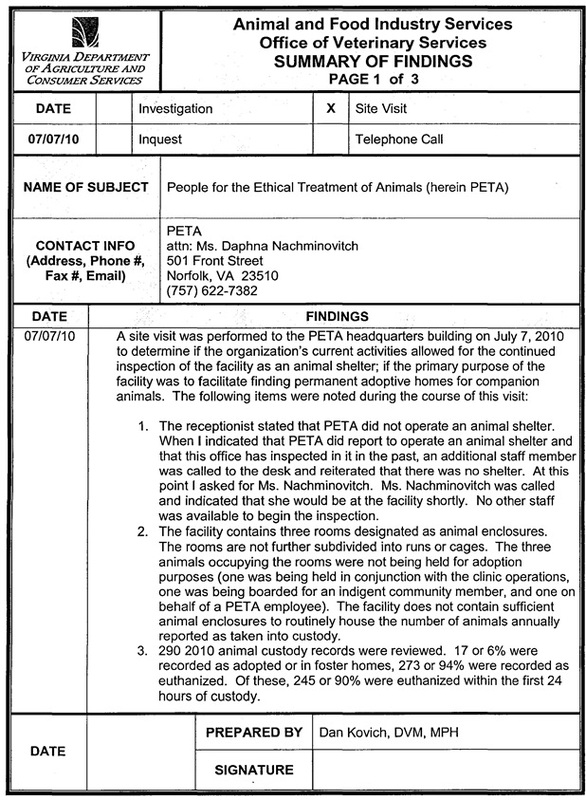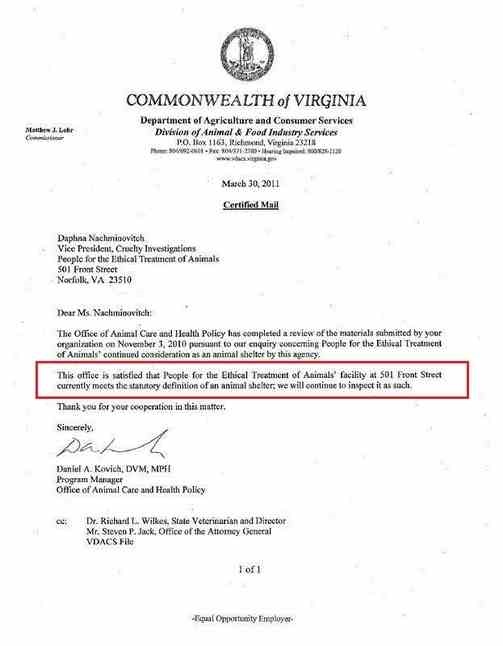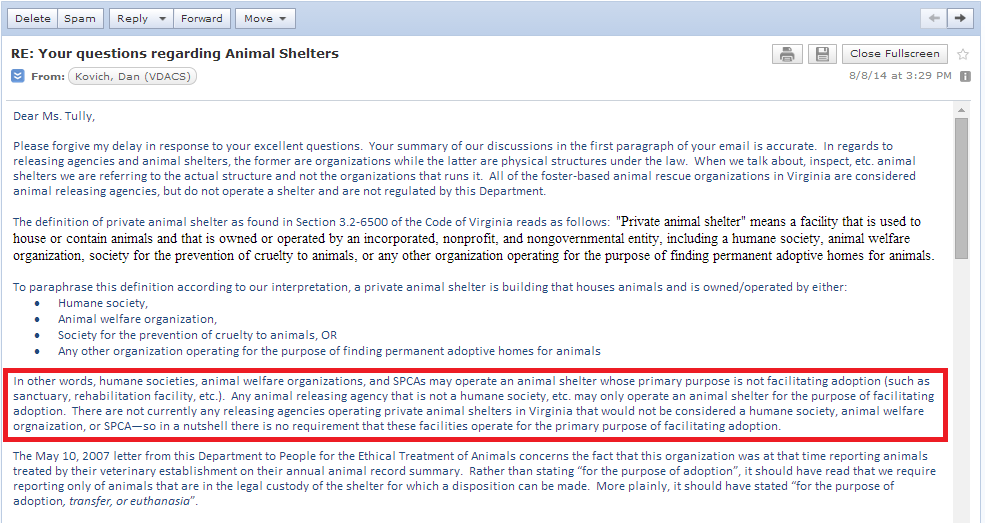The Scoop on PETA's 2010 VDACS "Site Visit" Report
|
Often mistakenly referred to as an "investigation report," this document is actually a "site visit" report, and it's typically used by PETA's detractors to create drama and confusion regarding PETA's shelter.
In 2010, precipitated by an email to his office asking for clarification regarding the purpose of PETA's Norfolk animal facility, State Veterinarian, Dr. Dan Kovich, DVM, conducted a site visit at PETA's Norfolk facility to get a better understanding of the type of work the animal rights group was doing there. Though PETA's facility had been annually inspected by a State Veterinarian as an "animal shelter" for over a decade, Dr. Kovich felt it prudent at the time to reassess whether or not PETA's shelter currently met the statutory definition of "animal shelter" and whether it would continue to be inspected as such, or considered to be a "veterinary establishment" going forth. As part of the reassessment process, Dr. Kovich spoke with Daphna Nachminovitch, the vice president of PETA's Cruelty Investigations Department and the person who oversees PETA's shelter. Additionally, Dr. Kovich performed an assessment of PETA's facility and analyzed the data contained in PETA's 2010 Virginia Department of Agriculture and Consumer Services "animal custody records." He then constructed charts and graphs that quantified the proportions of PETA's adoptions, transfers, and euthanasia procedures, in an endeavor to determine the facility's "primary purpose." |
|
When Dr. Kovich generated this site visit report, he documented that according to Ms. Nachminovitch, the majority of animals that were taken into custody by PETA were considered by them to be unadoptable, and that Ms. Nachminovitch had indicated to him that adoptable animals were routinely referred to other area animal shelters for adoption. Consistent with Ms. Nachminovitch's statements, Dr. Kovich documented that according to the findings of his site visit, PETA did not operate a facility that primarily found homes for animals. Operating under the assertion that PETA's facility must operate for the primary purpose of finding permanent adoptive homes for animals, in order to meet the statutory definition of "animal shelter," Dr. Kovich documented that no further action would be taken regarding the findings of his site visit, until such time that Ms. Nachminovitch could respond with material supporting the "legitimacy of PETA for full consideration as an animal shelter."
Asserting the legitimacy of their facility for full consideration as an "animal shelter" was of paramount importance to PETA if they were to continue taking custody of animals for the purposes of adoption and transfer, and reuniting strays with their guardians. Interestingly, however, PETA's facility did not need full consideration as an animal shelter to provide the service of humane euthanasia to community animals who require it, since PETA already operated a "veterinary establishment" that employed at least one full-time veterinarian, and veterinary establishments can perform humane euthanasia as a veterinary service with no requirements that they report their euthanasia "numbers" to the state. |
Ultimately, it was determined that PETA had had the law on their side the entire time. Dr. Kovich had made an honest mistake in asserting that facilities must operate for the primary purpose of finding permanent adoptive homes for companion animals, in order to be considered "animal shelters" by the state. At the time, this was the state of Virginia's statutory definition of "animal shelter":
"Animal Shelter" means a a facility, other than a private residential dwelling and its surrounding grounds, that is used to house or contain animals and is owned, operated, or maintained by a non-governmental entity including a humane society, animal welfare organization, or society for the prevention of cruelty to animals, or any other organization operating for the purpose of finding permanent adoptive homes for animals.
There had never been a requirement that PETA's shelter operate for the primary purpose of finding permanent adoptive homes for animals. Because PETA's shelter did operate for the purpose finding permanent adoptive homes for the relatively few adoptable animals they received, PETA's facility already met the statutory requirements for full consideration as an "animal shelter." On March 30, 2011, Dr. Kovich generated a superseding document stating that his office had completely reviewed the materials PETA submitted and that his office was satisfied that PETA's Norfolk facility met the statutory requirements for "animal shelter."
The state has since changed the statutory definition of "animal shelter" to specifically refer to "private animal shelters." PETA's shelter is now considered to be a "private animal shelter" by the state, and it continues to be inspected as such. This is the current statutory definition for "private animal shelter":
"Private animal shelter" means a facility that is used to house or contain animals and that is owned or operated by an incorporated, nonprofit, and nongovernmental entity, including a humane society, animal welfare organization, society for the prevention of cruelty to animals, or any other organization operating for the purpose of finding permanent adoptive homes for animals.
"Animal Shelter" means a a facility, other than a private residential dwelling and its surrounding grounds, that is used to house or contain animals and is owned, operated, or maintained by a non-governmental entity including a humane society, animal welfare organization, or society for the prevention of cruelty to animals, or any other organization operating for the purpose of finding permanent adoptive homes for animals.
There had never been a requirement that PETA's shelter operate for the primary purpose of finding permanent adoptive homes for animals. Because PETA's shelter did operate for the purpose finding permanent adoptive homes for the relatively few adoptable animals they received, PETA's facility already met the statutory requirements for full consideration as an "animal shelter." On March 30, 2011, Dr. Kovich generated a superseding document stating that his office had completely reviewed the materials PETA submitted and that his office was satisfied that PETA's Norfolk facility met the statutory requirements for "animal shelter."
The state has since changed the statutory definition of "animal shelter" to specifically refer to "private animal shelters." PETA's shelter is now considered to be a "private animal shelter" by the state, and it continues to be inspected as such. This is the current statutory definition for "private animal shelter":
"Private animal shelter" means a facility that is used to house or contain animals and that is owned or operated by an incorporated, nonprofit, and nongovernmental entity, including a humane society, animal welfare organization, society for the prevention of cruelty to animals, or any other organization operating for the purpose of finding permanent adoptive homes for animals.



